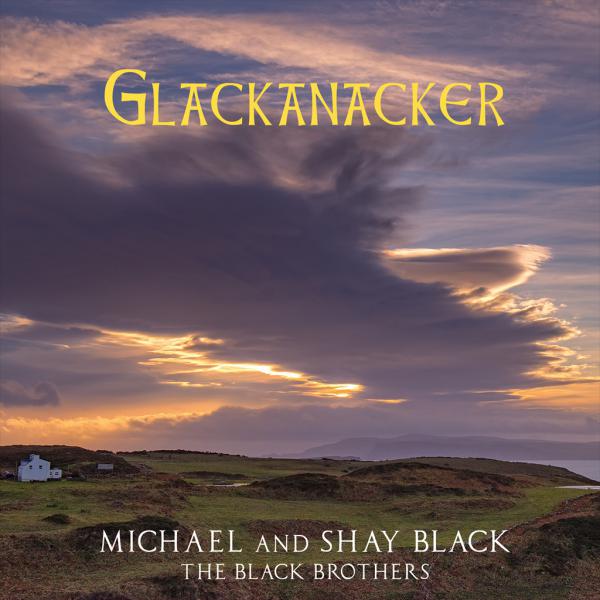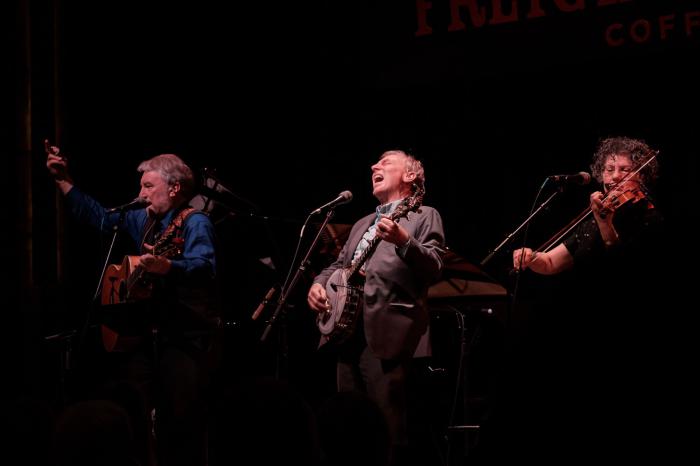Getting Green With the Black Brothers
Michael and Shay Black don’t put on concerts so much as convene celebrations, something we can certainly use more of in the present unpleasantness. Performing as the Black Brothers, the Bay Area contingent of Ireland’s most illustrious and prolific musical clan, they tend to keep a fairly low profile these days, until March rolls around.
This year’s parade of Black Brothers performances leading up to St. Patrick’s Day includes Tuesday March 10 at Michael’s on Main Street in Soquel and Saturday March 14 at Pacifica’s Mildred Owen Concert Hall. The promenade culminates with a multigeneration family gathering Sunday March 15 at Berkeley’s Freight & Salvage. The communal vibe flows from the nature of their repertory, which brims with traditional and contemporary tunes that invite audiences to participate.
“We usually look for songs that have a chorus, mainly because over the years we’ve sung with family,” says Shay, a longtime Berkeley resident who settled in the East Bay in the mid-1980s. “We’re seen as a family of singers, and it’s very rare that we sing a song that doesn’t have a big fat chorus. We traditionally encourage the audience to join in.”
“Shay and I don’t write songs,” Michael adds. “We steal them from everyone else and we try to find songs that aren’t done to death. That’s what marks us. And besides big choruses, we pick songs that have stories.”
Aside from offering succor in deeply troubling times there’s more reason than usual for the siblings to celebrate, as March 15 also coincides with the release of the first new Black Brothers album since, well, that’s hard to pin down. Their Dublin-based brother Martin was still part of the group when the last Black Brothers album came out in 1995, What A Time. And they last joined forces on 2004’s Our Time Together, but that was the fourth and most recent release by the Black Family, a band that includes their sisters Mary and Frances Black, whose solo careers have made them iconic figures in Irish music (Frances is also an independent senator in Ireland’s upper legislative house, the Seanad Éireann).
Martin, Mary, and Frances all contribute on the new Black Brothers album Glackanacker, which also introduces the new generation, including Mary’s daughter Roisin O, Frances’s offspring Aoife and Eoghan Scott, Shay’s daughter Shosi Black, and Michael’s daughter Ciara Black. Shosi and Ciara will also be joining in the fun at the Freight.
The Black Brothers band includes keyboardist Eamonn Flynn, accordionist Félim Egan, fiddler Colm O'Riain, and a troupe of step dancers led by Michael Murphy. Autumn Rhodes and Tim Hill open the Freight show with a set of traditional Irish tunes on uilleann pipes, flute, concertina, and tin whistle “and they’ll join us for several numbers too, so along with the step dancers we’ll have quite a cacophony,” Michael says.
Glackanacker was produced by the brilliant Irish guitarist John Doyle, who’s now based in Ashville, North Carolina. The Dublin-born Doyle has been a creative force in Irish music since his teens, when he cofounded the band Chanting House with vocalist Susan McKeown. After moving to New York City he cofounded the popular band Solas in 1996, and went on to record several sensational albums with fiddler Liz Carroll.
Sought after as an accompanist, collaborator and producer, Doyle is also an impressive songwriter who contributes several pieces to Glackanacker (he also produced Michael Black’s first solo project, an eponymous 2007 release on Compass Records). He was eager to jump into another Black recording. “I’ve always admired Michael and Shay’s singing,” Doyle says. “They have been immersed in song and tradition all their lives. The meaning and emotion of the songs flows freely and intuitively from them and leaves no barrier for the listener to face. I believe them.”
Part of what makes Black Brothers performances so colorful is that they draw on a vast and vivid repertoire. Glackanacker captures a good deal of their range, with an array of funny, fierce, poignant, and joyful tunes. There’s even one without a chorus, Irish-American singer/songwriter Cathie Ryan’s “Grace O’Malley,” about a legendary pirate warrior.
Shay found that the song resonated when he played a Freight concert last year to mark the 1,000 songs he’d covered in a Monday night class he’s taught at the Berkeley venue and school over the last decade. Their shows are also peppered with shanties that Shay collected during the two decades he lived in Liverpool, touring widely throughout Europe with the legendary shantyman Stan Hugill. He’s inculcated a generation of East Bay denizens with the easily taught tunes via his long-running Sunday night shanty session at Berkeley’s Starry Plough. The chants offer another way to invite audiences into the show. “Shanties and sea songs lend themselves to that,” he says. “We sing a line and then there’s a chorus, which is easy to repeat.”
While the siblings grew up in the Liberties neighborhood close to the heart of old Dublin, they were shaped by the summers they spent on Rathlin Island, a remote spot between Northern Ireland and Scotland where their father grew up. He brought the entire clan out to the island every summer to work on the family farm, immersing them in a rural lifestyle where Gaelic was the first language as recently as the 1950s.
“So we had the luxury, unlike a lot of other Dublin kids, of going up to this active farm where all his brothers and sisters would still go,” Michael says. “We had the best of both worlds, the remoteness, that rural traditional setting with no electricity and no cars, and then coming back to Dublin.”
Despite their best efforts, the situation for traditional Irish music in the Bay Area is less than green these days. While San Francisco has been the West Coast’s center of Irish American culture since the Gold Rush, there hasn’t been a real infusion of new talent from the Emerald Isle for years. A change in U.S. immigration policy in the mid-’80s opened to door to thousands of Irish, many of whom gravitated to Northern California. Among the new wave was Shay, who works at the Oakland family support agency Family Paths, and Michael, who came to the Bay Area in 1984 to study sociology at the University of California, Berkeley, eventually earning a Ph.D. But in recent years that flow of folks from Ireland has turned into a trickle.
“We don’t even have many students coming over because it’s difficult to get student visas these days,” Michael says “But the other problem is we don’t have a tradition of teaching the music to kids here. It’s been a real struggle to keep the music alive. The Irish cultural center in San Francisco has never really been interested in the music, though just recently Liam Reidy has started putting on shows there with some good bands. We played our first concert there last month.”
The welcome mat for tradition-minded music does seem to be out now at San Francisco’s United Irish Cultural Center. Rising singer/songwriter Aoife Scott, daughter of Frances Black, plays a series of gigs around Northern California next month, including an April 12 date at the UICC. Which isn’t to say that the Black clan is only involved in acoustic music. Mary Black’s son Danny O’Reilly is the lead singer in The Coronas, and if their moniker doesn’t get them quarantined, the acclaimed Irish rock band is slated to play The Troubadour in Los Angeles on April 21 and The Independent in San Francisco April 22.


